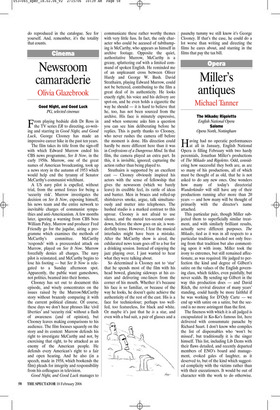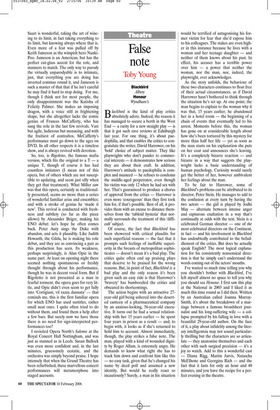Miller’s antiques
Michael Tanner
The Mikado; Rigoletto English National Opera Salome Opera North, Nottingham
Having had no operatic performances at all in January, English National Opera is filling February with two hardy perennials, Jonathan Miller’s productions of The Mikado and Rigoletto. Odd, considering how successful they both are, as are so many of his productions, all of which must be thought of as old, that he is not asked to do any new ones. One wonders how many of today’s directorial Wunderkinder will still have any of their productions running after more than 20 years — and how many will be thought of primarily with the director’s name attached.
This particular pair, though Miller subjected them to superficially similar treatment, and with similarly brilliant results, actually serve different purposes. The Mikado, tied as it was in all respects to a particular tradition, needed not only freeing from that tradition but also commenting upon it with irony. Miller took the irony to extremes, but still remained affectionate, as was required. He judged to perfection the kind and degree of Gilbert’s satire on the values of the English governing class, which tickles, even painfully, but never scalds. By sending up Gilbert in the way this production does — and David Ritch, the revival director of many years’ standing, could hardly be more faithful if he was working for D’Oyly Carte — we end up with satire on a satire, but the second is no more astringent than the first.
The fineness with which it is all judged is encapsulated in Ko-Ko’s famous list, here delivered with consummate panache by Richard Suart. I don’t know who compiles the list of dispensables who ‘won’t be missed’, but traditionally it is the singer himself. This list, including Lib Dems with their flaws detailed, and recently departed members of ENO’s board and management, evoked gales of laughter, as it deserved to, but of the kind which suggested complicity with the victims rather than with their executioners. It would be out of character with the work to do otherwise. Suart is wonderful, taking the art of wincing to its limit, in fact taking everything to its limit, but knowing always where that is. Even more of a feat was pulled off by Keith Jameson as the wimpish hero NankiPoo. Jameson is an American, but has the perfect cut-glass accent for the role, and manners to match. The only way to parody the virtually unparodyable is to intimate, just, that everything you are doing has inverted commas round it, and Jameson is such a master of that that if he isn’t careful he may find it hard to stop doing. For me, though I think not for most people, the only disappointment was the Katisha of Felicity Palmer. She makes an imposing dragon, with a voice still in frightening shape, but she altogether lacks the comic genius of Frances McCafferty, who has sung the role in the last few revivals. Vast but agile, ludicrous but menacing, and with the fruitiest of contraltos, McCafferty’s performance must go down to the ages on DVD. In all other respects it is a timeless show, and is always revived with devotion.
So, too, is Rigoletto, the famous mafia version, which fits the original to a T — a unique T, though of course it has had countless imitators (I mean not of this opera, but of others which are not susceptible to updating, and seem just silly when they get that treatment). What Miller saw was that this opera, certainly as traditionally presented, seems no more than a series of wonderful familiar arias and ensembles; and with a stroke of genius he ‘made it new’. This revival is conducted with freshness and subtlety (so far as the piece allows) by Alexander Briger, making his ENO debut: let’s hope he often comes back. Peter Auty sings the Duke with abandon, and acts it plausibly. Like Judith Howarth, the Gilda, he is making his role debut, and they are as convincing a pair as this production has seen. Its weakness, perhaps surprisingly, is Alan Opie in the name part. At least on opening night there seemed nothing spontaneous or freshly thought through about his performance, though he was in decent vocal form. But if Rigoletto is not presented as a man in fearful torment, the opera goes for very little, and Opie didn’t even seem to get fully into ‘Cortigiani, vil razza dannata’ — that reminds me, this is the first familiar opera for which ENO has used surtitles, rather small neat ones. I quite often tried to do without them, and found them a help after a few bars. But surely now we have those there is no need for sign-interpreted performances too?
I revisited Opera North’s Salome at the Royal Concert Hall Nottingham, and was just as stunned as in Leeds. Susan Bullock was even more confident and, in the last minutes, gruesomely ecstatic, and the orchestra was simply beyond praise. I hope intensely that when the Grand Theatre has been refurbished, these marvellous concert performances will metamorphose into staged accounts.



















































































 Previous page
Previous page